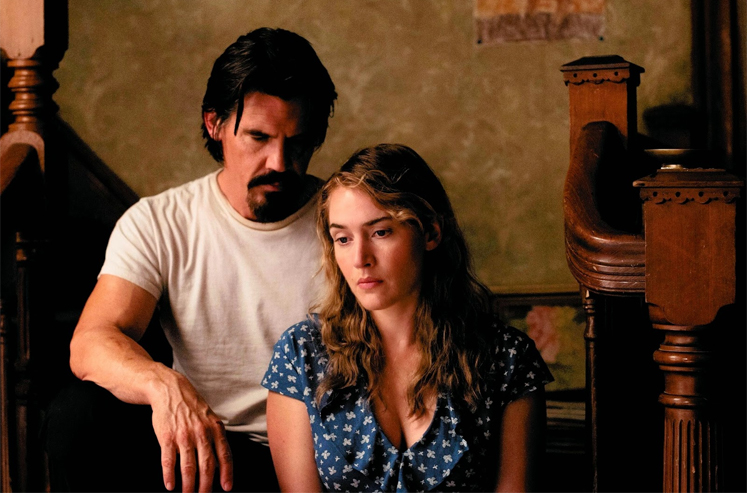Having never read the novel by Joyce Maynard, I can only comment on Labor Day the movie. But one gets the impression watching the film that director Jason Reitman is trying earnestly to make a faithful adaptation. The result is a movie whose story feels at arm’s length, and whose drama, a romantic ordeal involving an escaped convict (Josh Brolin) and the divorced woman with whom he holes-up (Kate Winslet), feels set within the precious, sealed-off confines of a snow globe.
Frank, the convict, meets Adele, the woman, and her son Henry (Gattlin Griffith) in a store in a small New Hampshire town and forces them to shelter him in their home. There he dresses his wound, and tries to set his captives/hosts at ease. He has a particular fondness for the boy, slipping naturally into a fatherly role. During the long Labor Day weekend, he cooks, cleans, patches up the house, cleans out the gutters, and generally adopts the role of a masculine ideal. The broken family suddenly has the strength and stability of a man around the house.
Labor Day is drenched in earthy tones and a dim, low-slung light. This tonality is mixed with Terrence Malick impersonations (cinematography by Eric Steelberg) – wistful flashbacks in which sunlight flickers though whipping white curtains. The visual effect doesn’t so much situate the story within the thematic realm of time, loss, and yearning, as much as it underscores a lingering nostalgia. Reitman’s other gestures include symbolic attempts, like a recurring fumbling with the car’s gear shift, or characters who enter the frames from an out-of-focus blur to intensify the isolation.
Stagnation and isolation are some of Labor Day’s key themes, and more specifically, the kind of isolation that allows for love that would otherwise not be possible. Adele is a kind of romantic wild woman. She’s an intense feeler, an impetuous and severe sentimentalist. She asks her son if he’s learned about sex, and when the boy tries to brush off the awkward intrusion into adolescence, she insists on telling him how it “feels,” and about the “hunger.” Adele must be very hungry. After her divorce, she has become a recluse, and one of the carrots that keeps us chasing after this film is the mystery of her inner trauma. But Frank’s arrival offers the perfect scenario for someone like Adele. Their love is possible precisely because it is impossible; it could never lead to anything beyond the early stages of infatuation and so the two can throw themselves in with complete abandon. Even as the two lovers begin to dream of fleeing to Canada, there is a bittersweet sense that if they manage to avoid the police who are constantly circling through the town looking for the escapee, it is not likely that they will ever elude themselves.
A story so much about the need for the physical other, Labor Day is told primarily through the eyes of the son, which allows the film to retain a certain measure of sexual innocence. He hears noises at night, but real sensuality is provided by Frank’s cooking. It turns out Frank is a very good cook, and a centerpiece scene involves the baking of a pie. It is a hot and steamy moment, and judging from the groaning of the audience when the desert swells in the oven, Reitman could make devastating commercial for Betty Crocker. But baked pies don’t help Labor Day traverse very deeply into the sexual territory it seems to want to wade into. Nor does a subplot involving an adolescent romance between Henry and Mandy (Maika Monroe), a new girl in town. Precocious and sardonic, Mandy feels shipped in from another movie (maybe Reitman’s Juno), and the two teenagers’ scenes are weighted down with sit-com-y chatter.
Kate Winslet gives her character all the pathos we can hope from such a sketchily-drawn figure, and the result is a palpable sense of wounded tenderness. We can feel her quieted desperation, and while the inertia of the story makes Frank and Adele’s romance feel inevitable, Winslet introduces just enough trepidation to create tension. Josh Brolin’s is strongest in the small flashes of physicality, and Reitman does well to capture the way his performance allows gestures – the tearing of tape, the kneading of dough, the tying of knots — to stir-up a sense of fear. The fear never goes away. It enters with Frank-as-threat, and when he transforms into Frank-as-father/lover, the fear is sustained by the slow rolling patrol cars and nosy neighbors who place the romance and new-sprung family under siege.
This siege provides Labor Day with an intriguing scenario, but Reitman never seems to figure out how to take it anywhere. He has plenty of ingredients for a good story — a turbid romance, a splintered family, adolescence, the friction between personal desire and paternal and maternal responsibility – but only manages to cook up sentimentality. It makes Labor Day a restrained melodrama, a movie whose soapy story stirs up a bevy of surface emotions, but can never penetrate past them. Feeling is its theme and its mimetic intent, and to that end Reitman has managed to make a film that makes us feel. But without much more to hold onto, it also makes the movie feel like a passing fancy.





